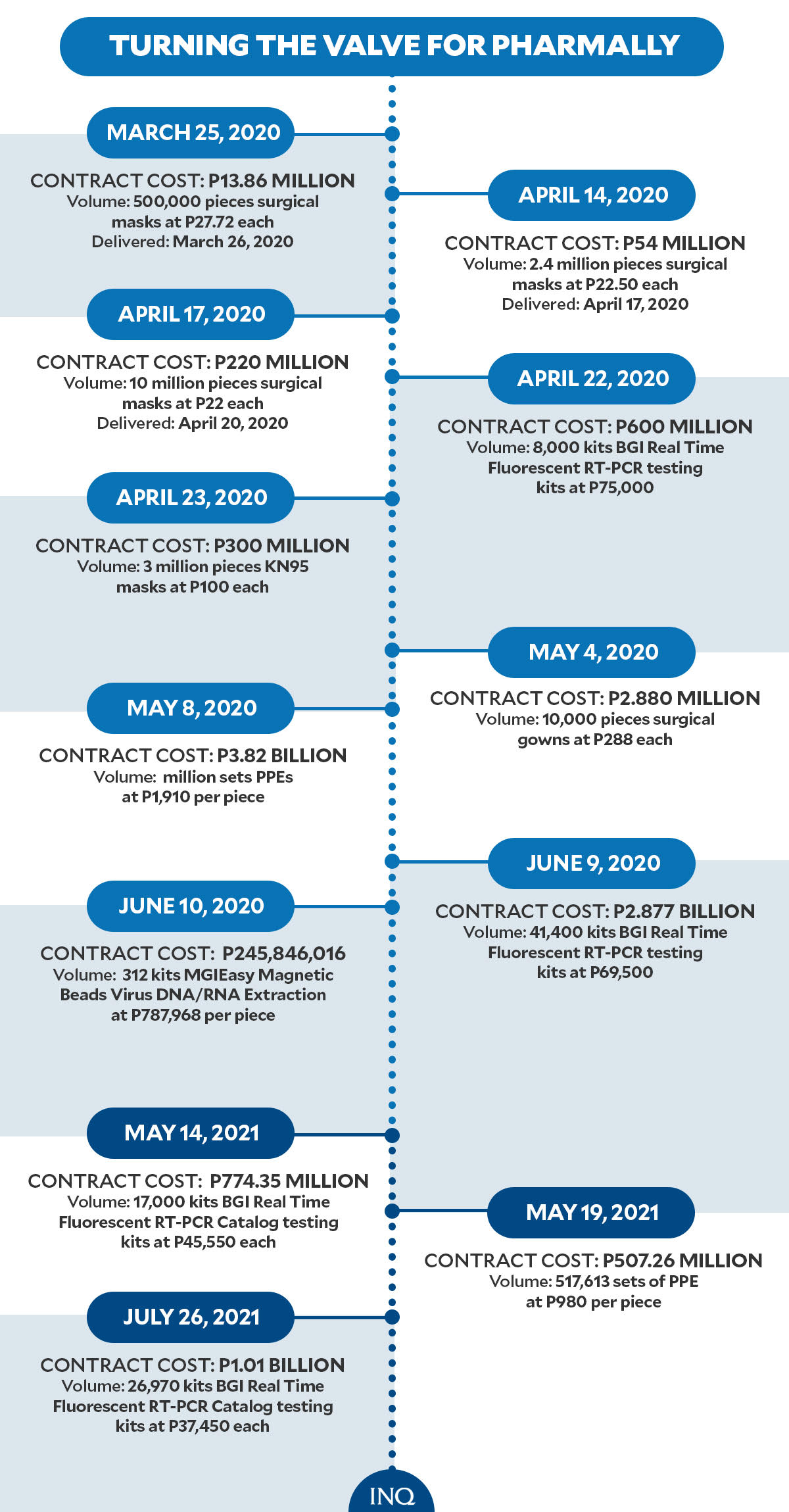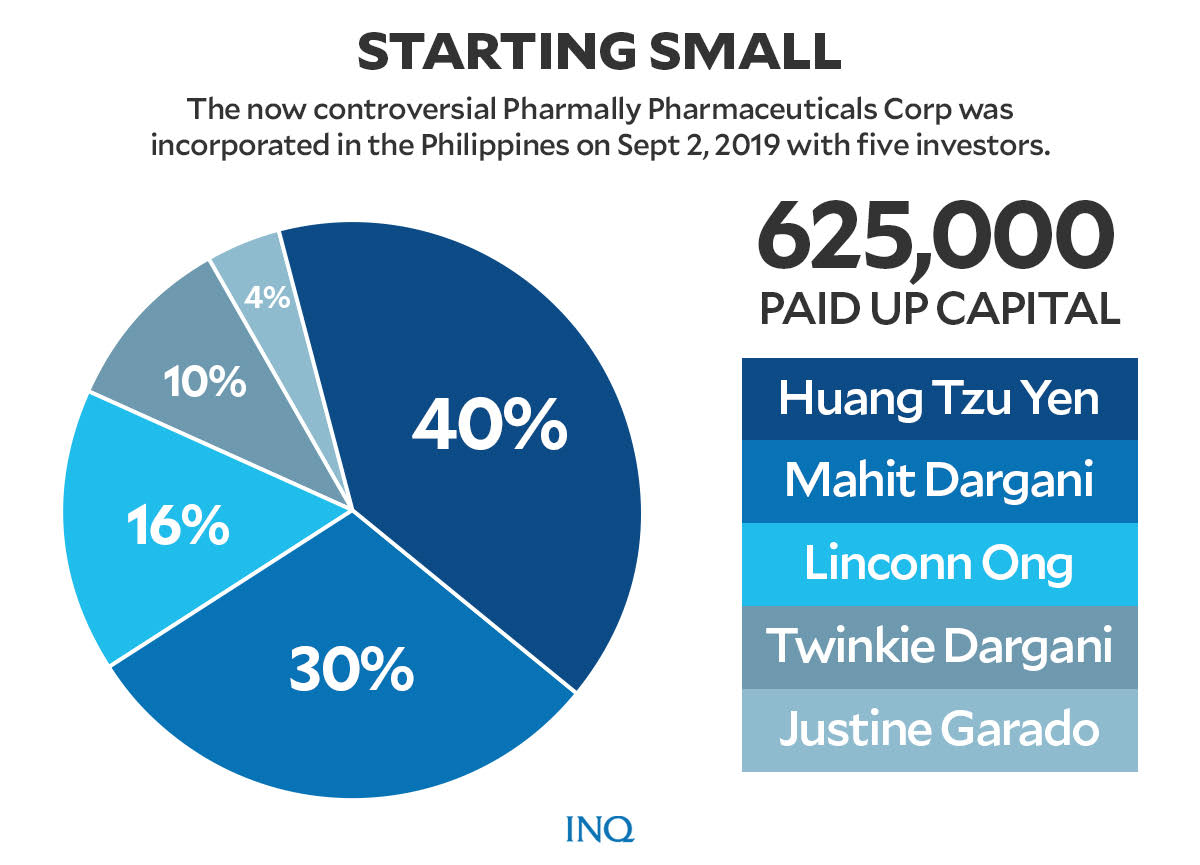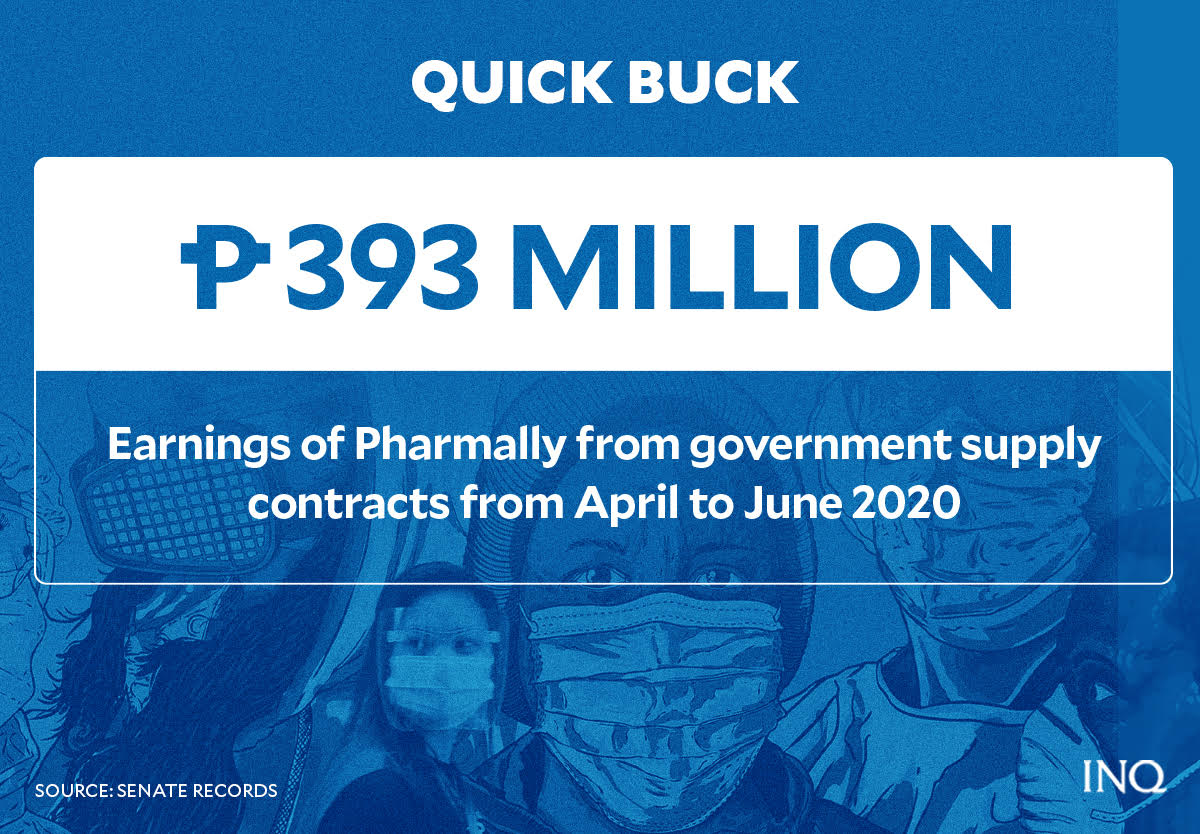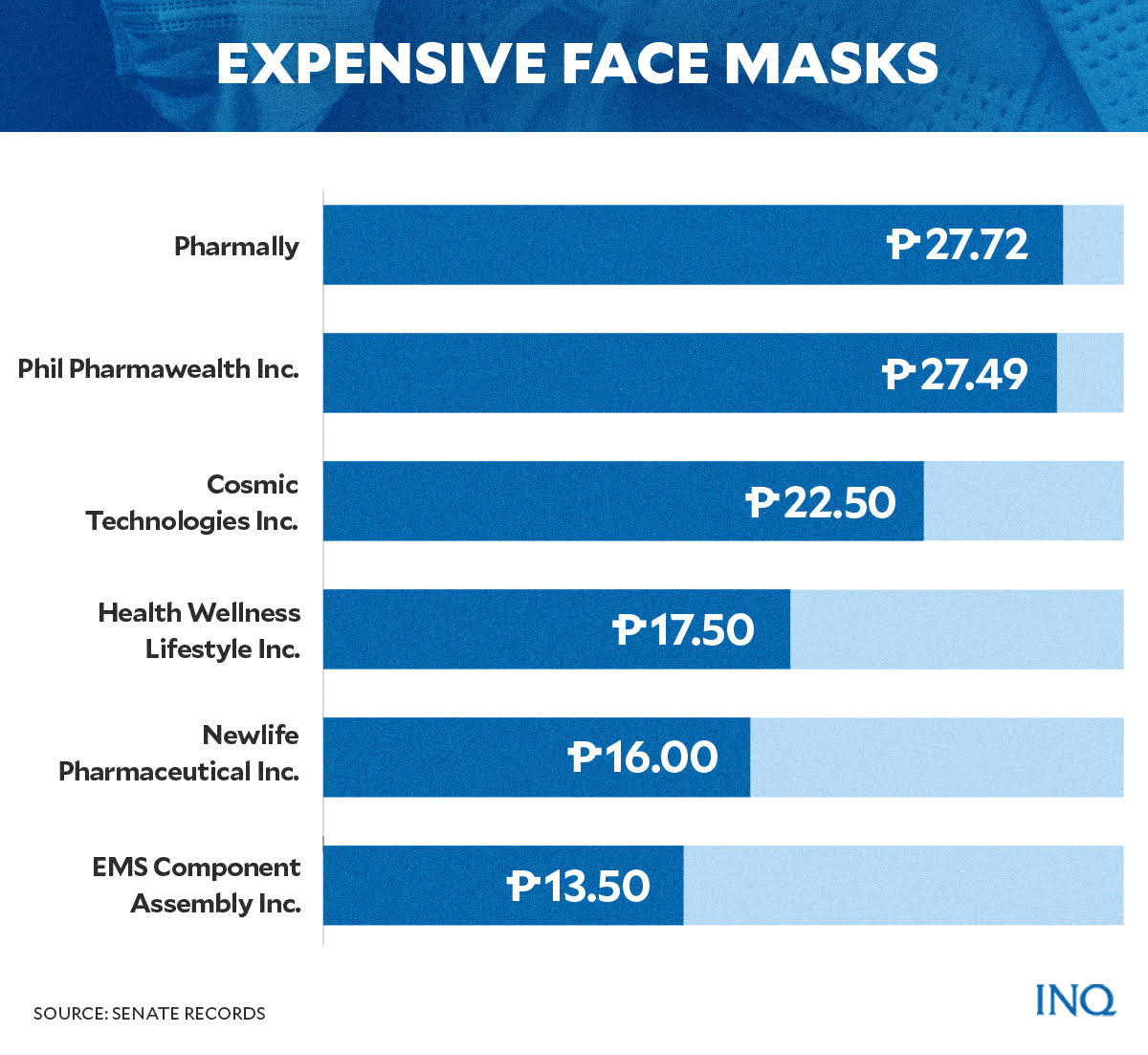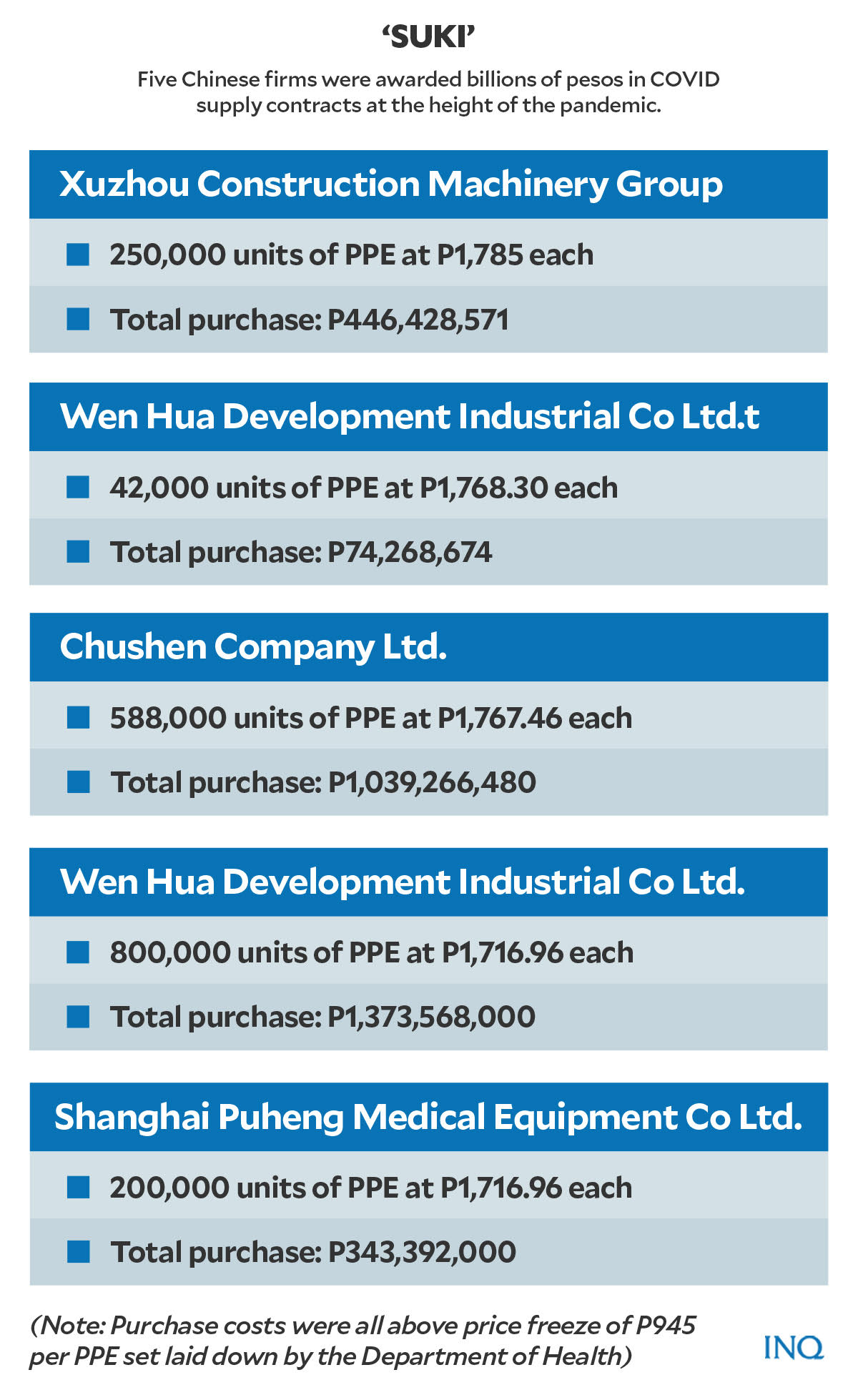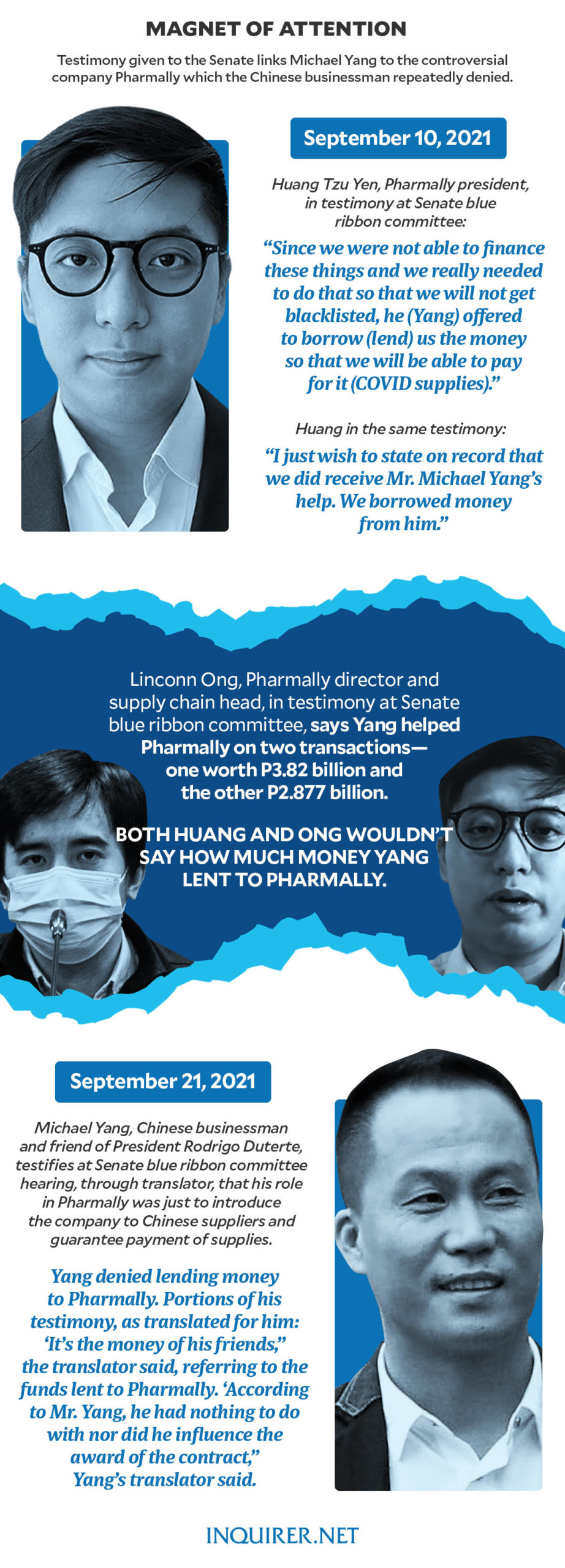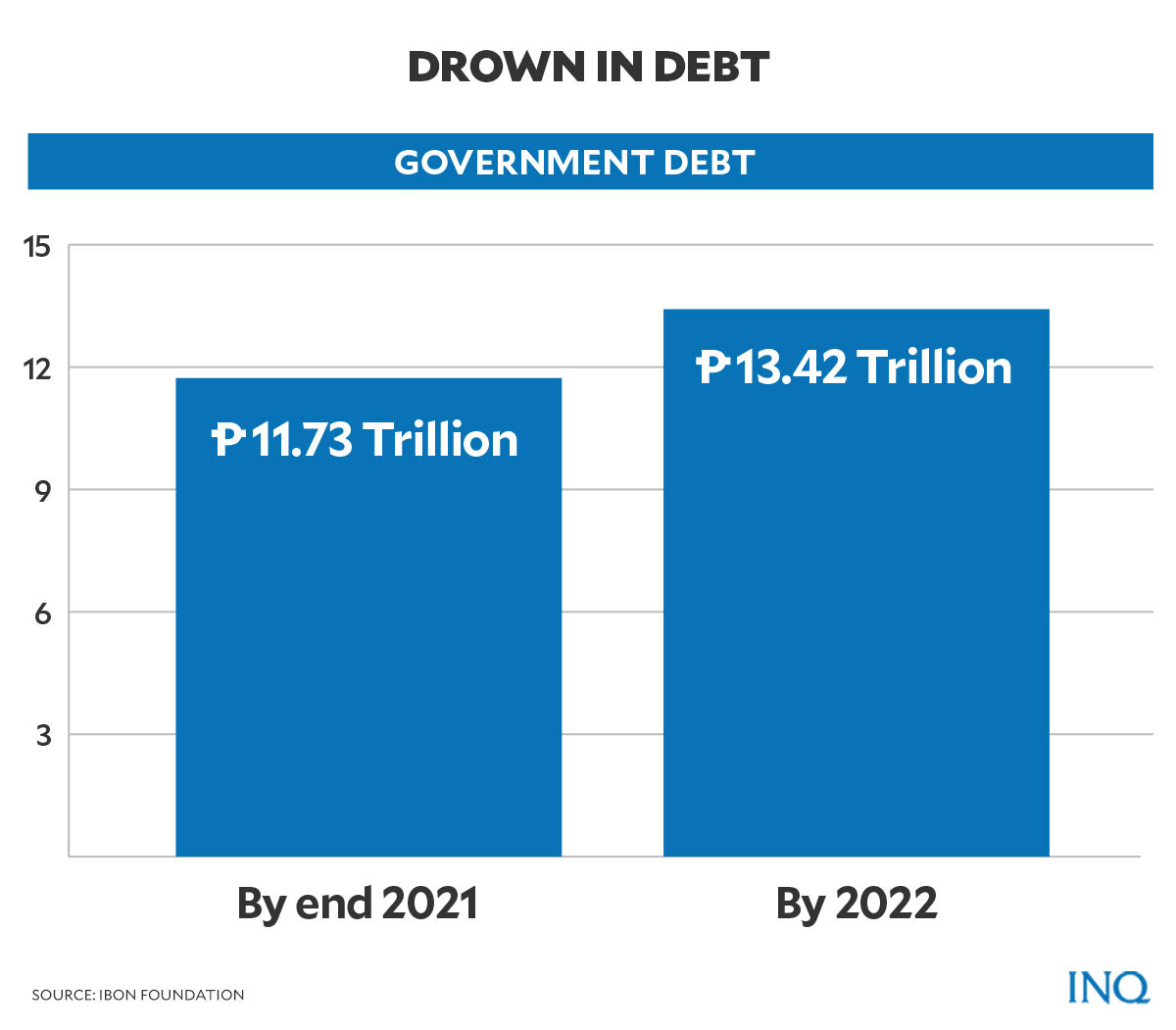2021: Pharmally scandal rubs salt on pandemic wounds
MANILA, Philippines—In 2021, as the country’s battle with COVID-19 continued, the government got entangled again in a string of controversies that included what many thought was unthinkable—a corruption scandal that involved funds needed to fight the pandemic.
In this year-end report, INQUIRER.net takes a look at the major graft and corruption scandals that gripped the nation as much as the pandemic did. INQUIRER.net also takes a glimpse at the challenges that the administration succeeding Rodrigo Duterte’s would face.
Pharmally scandal
The controversial multi-billion peso transactions between the government and Pharmally Pharmaceuticals Corp. or just Pharmally—a foreign-owned company—was perhaps the biggest corruption scandal that drew attention this year even as COVID continued to rage.
P12 billion—this was how much the government paid Pharmally to deliver COVID supplies—some of it flagged to be overpriced.
The controversy goes way back to the release by the Commission on Audit (COA) of its annual audit report last August, which showed deficiencies in how the Department of Health (DOH) managed its P67.32 billion fund to fight the COVID-19 pandemic in 2020.
Among the deficiencies flagged by COA was the P42 billion for COVID supplies that were transferred by the DOH to the Procurement Service of the Department of Budget and Management (PS-DBM).
The PS-DBM handles large-scale procurements for the government during the pandemic, including COVID supplies. Government agencies, on the other hand, can purchase supplies from the PS-DBM instead of dealing directly with private suppliers.
This triggered the Senate blue ribbon committee investigation into the use of pandemic funds by the DOH in 2020 focusing on the P42 billion fund transfer between the DOH and PS-DBM and allegations of price markups in the procurement of PPE sets and the murky backgrounds of suppliers that cornered bulk of the supply contracts.
READ: As probe shines light on COVID deals, more questions arise
The investigations, later on, uncovered a string of anomalies in transactions between the DOH, Department of Transportation-Philippine National Railways (DOTr-PNR) and Pharmally—which was among the firms recommended to and chosen by PS-DBM to supply face masks, test kits, PPEs and other medical supplies for the pandemic.
The little-known company, which was registered at the Philippine Securities and Exchange Commission (SEC) on Sept. 4, 2019, by Huang Tzu Yen, a Singaporean, bagged 13 contracts with the government worth a total of P10.85 billion—all involving supplies for COVID response—despite having a declared paid-up capital of only P625,000.
The P10.85 billion worth of contracts were comprised of contracts awarded in 2020—which were worth P8.52 billion altogether—and an additional P2.33 billion supply contract secured by Pharmally from May to July 2021.
In the first three months alone, Pharmally secured big-ticket deals worth P8.5 billion, around 13 times more than the firm’s paid-up capital.
The Senate also found that of the six companies, which supplied face masks to DOH through PS-DBM, Pharmally had the highest unit price at P27.72 apiece.
The COA report listed the unit price of face masks procured from five other companies:
- Newlife Pharmaceutical, Inc.: 50,000 surgical masks — P16 (unit price)
- Cosmic Technologies Incorporated: 300,000 surgical masks — P22.50 (unit price)
- Phil Pharmawealth, Inc.: 100,000 — P27.49 (unit price)
- EMS Component Assembly, Inc.: 100,000,000 surgical masks — P13.50 (unit price)
- Health Wellness Lifestyle, Inc.: 600,000 surgical masks — P17.50 (unit price)
- Aside from face masks, Pharmally also supplied COVID test kits that cost P1,720 each. Other suppliers sold kits at around P925 each.
The PPE sets from the firm cost P1,910 each while market prices averaged P945 per test kit in May 2020.
READ: Chinese firms profit off PH amid the pandemic
Senate Minority Leader Franklin Drilon said in September that Pharmally, whose role was just as a middleman, had earned P393 million in total from government contracts for the supply of face masks and face shields from April to June 2020.
READ: Pharmally scandal: When middlemen profit even during a pandemic
The congressional investigation likewise found P52.9 million in brand-new luxury vehicles registered to the top three executives of Pharmally just after the company bagged the juicy deals from the government.
The luxury vehicles were:
- P13.5 million – Lincon Ong’s Porsche Carrera 4S
- P5.9 million – Ong’s Lexus RCF
- P13 million – Twinkle Dargani’s Lamborghini Urus (SUV)
- P8.5 million – Mohit Dargani’s Porsche 911 Turbos S
READ: Exposing wrongdoing: The uncertain fate of whistleblowers in PH
Several big names were linked to the allegedly anomalous transactions, including former PS-DBM head Lloyd Christopher Lao, who signed most of the contracts for PS-DBM, and Chinese businessman Michael Yang, former economic adviser of President Rodrigo Duterte, who allegedly lent money to Pharmally for the procurement of PPEs in 2020 based on statements by Pharmally officials.
Yang, however, denied the allegations.
READ: At Senate probe, more questions beg for answers on Michael Yang
READ: Pharmally scandal: Due diligence failure overshadows debate on law
The name of Sen. Christopher Bong Go, Duterte’s closest confidante, has also frequently emerged in the Senate investigations.
In a recent interview with ABS-CBN’s HeadStart, Senate blue ribbon committee chair Sen. Richard Gordon said Lao, Deputy Ombudsman Warren Rex Liong and lawyer Daryl Valles were either campaign supporters of Duterte and worked with Malacañang.
All three officials had allegedly worked under Go back when he was still officially Special Assistant to the President (SAP).
READ: Gordon says Malacañang’s hallmarks all over Pharmally mess as past officials get involved
Lao has already denied such claims last August, but in a hearing of the House committee on public accounts, committee chair and Probinsyano Ako Rep. Jose Singson showed him a letter that Lao signed as an undersecretary of SAP—Go’s position before he was elected to the Senate in 2019
READ: Ex-DBM Usec Lao denies working for Bong Go; solon shows him letter he signed as SAP’s Usec
On Dec. 7, Go has again denied accusations regarding his alleged links to the persons involved in the anomalous transactions between Pharmally and the government.
READ: Bong Go: Duterte and I have no ties with those nailed in Pharmally mess
The controversy pushed a group of medical frontline professionals to issue a manifesto titled “A Collective Expression of Indignation and the Call to Action” calling for an end to the alleged mishandling of COVID funds amid the pandemic.
READ: Corruption scandals amid pandemic: When doctors shout for change
“We shout out our indignation and intolerance to what is happening! We will no longer compromise the truth for what we have been conditioned to believe to be true but clearly isn’t, we shall not go down the slippery slope of decay as a nation,” the manifesto read.
“We cannot go on fighting for every Filipino’s life and health if we cannot work together—because we are afraid, because we are severely handicapped, because we are in pain – physically and psychologically, because our numbers are dwindling,” it continued.
Another Philhealth issue
Last year, the Philippine Health Insurance Inc. (PhilHealth) was linked to a scandal of proportions unseen before, allegations of widespread corruption in the agency amid the COVID-19 pandemic, which prompted the resignation of several of the agency’s officials.
Lawyer Thorrsson Montes Keith—who resigned due to “rampant and patent unfairness in the promotion process” and delayed salaries and hazard pay—testified at the Senate and revealed anomalies which resulted in the loss of P15-billion in the state insurer’s funds, allegedly pocketed by members of the agency’s “mafia.”
READ: P15 billion went to PhilHealth ‘syndicate’ – whistleblower
READ: COA flags ‘overpriced’ PhilHealth IT project
READ: Morales admits ‘systemic’ fraud in PhilHealth can’t be resolved in just one year
READ: Morales: PhilHealth ‘potentially lost’ P10.2B to fraud in 2019
This year, after a massive backlash because of the corruption issue, PhilHealth clarified that 98 percent of the P15 billion allegedly lost to corruption has already been liquidated as of March 2021.
In a statement posted on its Facebook page, the state insurer explained that P14.7 billion has been “allocated” as assistance to 711 hospitals nationwide for the COVID-19 pandemic.
PhilHealth also maintained that the liquidated funds have been “properly accounted” for.
The P14.7 billion was liquidated under PhilHealth’s Interim Reimbursement Mechanism (IRM).
The IRM is PhilHealth’s emergency cash advance measure to provide hospitals with emergency funds to respond to natural disasters, calamities and other unexpected events.
The IRM was temporarily suspended last August after some senators called for a halt to payments to hospitals for COVID-19 service amid allegations that the release of funds was marred by irregularities.
READ: PhilHealth suspends COVID-19 payments
However, on Dec. 5, the COA in its 2020 audit report for PhilHealth, raised issues on the payments made by the state insurers to various hospitals nationwide last year.
According to COA, the PhilHealth released funds under the IRM scheme without legal basis and for services not yet rendered, which the COA said was contrary to Presidential Decree No. 1445, or the Government Auditing Code that prohibits advanced payments for services, supplies, and materials not yet delivered under government contracts “except with the prior approval of the President.”
The funds released to 711 government and private hospitals around the country were made following the PhilHealth Circular No. 2020-0007 issued on March 20, 2020, granting IRM funds as “advance payments for the provision of substantial aid to eligible/qualified HCIs directly hit” by the COVID-19 pandemic.
“Absence of proof showing that IRM fund releases have legal bases or prior approval of the President of the Philippines justifying exemption from the prohibition against advance payments, the disbursements made under the IRM scheme were without legal authority and could be considered illegal expenditures,” COA explained.
READ: COA report raises issues over P14.97 billion in PhilHealth emergency payments
The state auditor likewise flagged the release of P7.642 billion in IRM funds to 530 HCIs, without deducting a 2 percent creditable income tax required by Bureau of Internal Revenue (BIR) regulations.
On Dec. 11, INQUIRER.net also published a report detailing that PhilHealth possibly lost around P22.72 million last year, after the amount was supposedly spent on premium payments for 4,544 elderly members who were already dead.
COA reported that 8,156 deceased elderly PhilHealth members were still on the state insurer’s database.
The state auditor also found that around 4,544, or 55.71 percent of the deceased elderly were recorded in 2019 but remained included in billings to the DBM for 2020, “resulting in over subsidy from the national government amounting to P22.72 million.”
READ: COA questions on PhilHealth involve both living and dead
COA said that PhilHealth had “deficient, weak” controls in its data collection and that this weakness could expose the state insurer to the “risk of generating inaccurate/unreliable data and possible payment of fraudulent claims.”
PhilHealth, in response to COA’s remarks, said it would ask help from the Philippine Statistics Authority (PSA) to clean up its database and give COA full access to documents on the “unsubstantiated” payment of P3.375 billion it had made for COVID-19 tests which were also flagged by the state auditor.
READ: PhilHealth cleaning up database with PSA’s help
“We have signed a memorandum of agreement (MOA) recently with the PSA to share data on deaths so we can clean our database on this issue,” said PhilHealth spokesperson Shirley Domingo.
Domingo also explained that “unless reported to us by their relatives, we don’t have a way to monitor deaths unless the data is shared with us by other government agencies that capture this data.”
Onto the next admin
In Jan. 2016, then-presidential candidate Davao City Mayor Duterte dared the public to kill him if he failed to bring down crime and corruption in the country during the first six months of his term.
“One whiff of corruption, you’re out.”
Duterte likewise made this statement in 2016, saying he won’t condone even a “whiff” of corruption under his administration.
READ: As whiff of corruption emits bad odor, Duterte quick to defend his men
However, five years later, Duterte—with his administration dogged by scandals and allegations of graft and coverups throughout his term—admitted himself that eradicating corruption was “impossible.”
READ: Corruption under Duterte: A record to kill for
READ: Duterte admits eradicating corruption ‘impossible’
In his penultimate State of the Nation Address, Duterte said corruption was “endemic in government” and “nobody can stop corruption unless you overturn the government completely.”
“We are not proclaiming that we have gotten rid of corruption. There is still corruption in this government and any other government that will come after me and in the past—it is always there,” he said.
READ: Corruption scandals under Duterte: From whiff to helplessness
As the year closes, so do Duterte’s few remaining months as president.
As the country moves closer to the 2022 general elections, the next administration would not only face the graft and corruption issues that gripped the nation this year and in previous years, but also a gargantuan economic challenge and a mountain of debt, according to Sen. Panfilo Lacson.
“The presidency—I’m saying this without politics, this is just practical application—cannot be practiced because the problems which will be faced by the next administration are already massive. It’s not OJT (on-the-job training),” he said.
“You have to appreciate the problems. Don’t just enter without knowing your problems because you will have a hard time finding solutions,” he added.
READ: Trillions and counting: The mountain of debt next president has to climb
Data from the Department of Finance (DOF) showed that the country has so far borrowed a total of P1.15 trillion for the COVID fight.
The Bureau of the Treasury (BTr) recently released data that showed that the country’s total debt has reached a historic high of P11.97 trillion as of October 2021.
This was at least 0.46 higher than the P11.92 trillion in September. The BTr also said year-on-year debt stock rose by 19.4 percent from over P10 trillion in October 2020.
READ: Outstanding gov’t debt hit historic high in Oct
The DOF reported last month that the national government’s outstanding debt might reach a record-high P13.42 trillion by the end of 2022—which will be faced by the next president and his or her administration.
TSB
For more news about the novel coronavirus click here.
What you need to know about Coronavirus.
For more information on COVID-19, call the DOH Hotline: (02) 86517800 local 1149/1150.
The Inquirer Foundation supports our healthcare frontliners and is still accepting cash donations to be deposited at Banco de Oro (BDO) current account #007960018860 or donate through PayMaya using this link.

